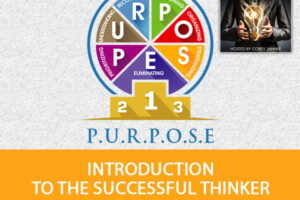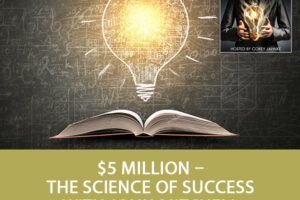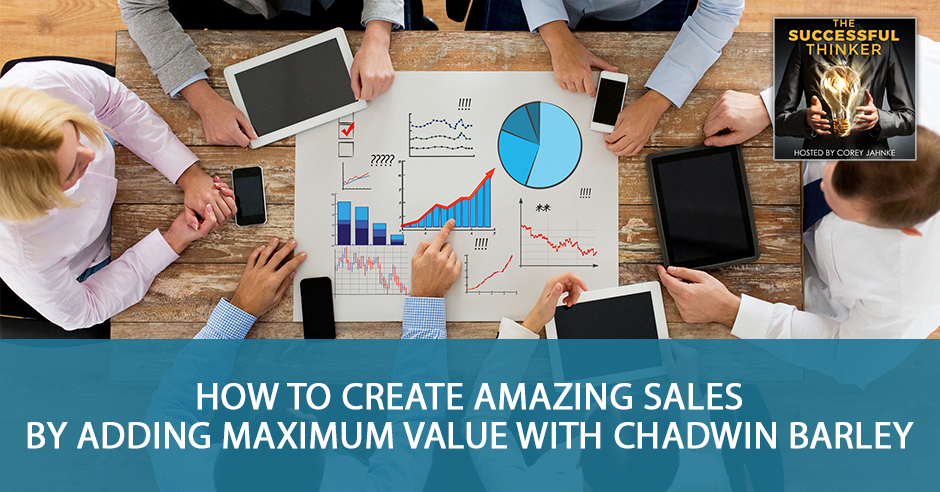
—
Listen to the podcast here:
How To Create Amazing Sales By Adding Maximum Value with Chadwin Barley
It’s Not What You Do, It’s How You Do It
I am fired up because I have one of those people that is what we lovingly referred to in my circles as a go-giver. This person’s name is Chadwin Barley. She’s a former marketing executive turned entrepreneur. She’s the Founder of Heart and Sold Austin, which is powered by Keller Williams. She has a mission with her business. What I love is that her mission is to give back and encourage others to do the same. She’s a wise lady because she also has a vision. Her vision is to bring generosity back to the face of real estate one community at a time and to exceed client expectations at every turn throughout their real estate transaction. Chadwin, how are you?
I’m doing great. Thank you.
Welcome to the show.
It’s a true honor.
I love real estate businesses because as you well know, a corner story in The Go-Giver book comes from a real estate salesperson who has to find her Go-Giver heart. Can you tell me why your real estate business is called Heart and Sold? Where did the name come from and what does it mean to you?
Most people have not been exposed to or exposed themselves to the truth. The truth is we get to create who we are. Anyone can start today, this minute, to create their own perfect life. If not you, then who? Share on XHeart and Sold come from a desire to create a business and a concept that resonated with me. I took the liberty of bringing love back to business and carrying back to business after a long stay in the corporate world, which wasn’t that much fun. I created the brand to hold myself accountable because from zero profitability and from day one, I chose to give a portion of my commissions at the close of every transaction to my client’s charity of choice. I knew that if I didn’t hold myself accountable to that in a public way, it would be a tough thing to do for myself. I wrote it into my mission, my vision and published it again for an accountability standpoint.
I remember Jim Rohn talking about going ahead and setting up your contribution to charity from the beginning because if it’s difficult to give $1 when you only made $10, it gets awfully difficult to give $1,000 when you make $10,000. Congratulations on that. I was noticing that you have a ton of credentials. I was curious about this transition between Corporate America and real estate. Why would someone who is in a long-time successful career leave the comfort of Corporate America?
I definitely can boil it down to some basic concepts. It’s easier to say than it is to live. One of the things was I was bored. I’m the type of person that likes a constant challenge and I had reached a point in my career that I could do the job with my eyes closed and my hands tied behind my back. The second part of it was I never had the corporate experience that was positive. It always seemed like a place that didn’t resonate with me. What I know in hindsight is that I’m entrepreneurial by heart. I always give in service a lot more than I take in payment. I made good money but I wasn’t making the money that I felt like I was extending the energy too. I thought, “What business can I get into where the level of which I expend effort pays me back financially because I had big goals and big dreams?”
Another thing that Jim Rohn said and I thought this was funny because you said, “It’s easier to say than it is to do.” He said, “People are always asking me, ‘Mr. Rohn, how good are you at maintaining your word and following your success principles and things like that?’” He said, “My answer is always, ‘Listen to me carefully, but don’t watch me too close.’” I admire your ability to recognize where your heart was. Let’s talk a little bit about The Go-Giver and how did that influence your transition into real estate?
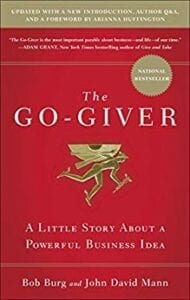
The Go-Giver, Expanded Edition: A Little Story About a Powerful Business Idea
Coming from a humble past, I went through college, put myself through school and join the corporate world. I was a true climber and maybe not even a nice person. What happened with that was I achieved a level of success and yet I found myself unsatisfied. I took some time to think about my life around the time I turned 40 to determine what kind of a legacy I wanted to leave, what my life should look like with that 20/20 vision of looking back. I didn’t like what I was seeing in the mirror. I read a lot of books and did a lot of reflection. I stumbled upon The Go-Giver as well as Think and Grow Rich. I don’t remember who introduced me to the books, but those two books resonated with me. I thought, “This is what I want. This is the life I want to lead. I want to be fulfilled in my career and not just financially successful.” The Go-Giver gave me permission to do that.
One of the things that Successful Thinkers do is they recognize to be successful in business, it’s not what do I have to do. It’s who do I have to become. I love that you spent time reflecting on that. It sounds to me like you must have challenged your core values. To give our listeners a context and a real sense of who you are, what are your core values? What do you feel like the word success means to you?
I would say that success is a combination of enjoying everyday elements or “nut and bolts” of what you do day-in and day-out while always having your goals in mind. It’s like the light at the end of the tunnel, what you see as your ultimate destiny and taking all of those into consideration so that you can make a positive impact on the world. At the end of the day, the nuts and bolts are important to get the job done but having a vision of what you want your life to look like and the legacy that you want to leave is what creates that fulfillment.
I am a great believer in working backwards, looking out at the legacy that you want to leave and building backwards from there. If I want to leave this legacy at the end of my life, what has to be true and one tomorrow and the next day? Congratulations on that. That must have taken a lot of hard work and soul searching on your own part. The transition could not have been easy. I would imagine there were tons and tons of obstacles. When obstacles present themselves in your life, what strategies and techniques for overcoming them do you employ?
I love that you gave me an opportunity to appear for this episode and I really gave that question some thought. What I came up with is a metaphor that I thought of was like a pyramid or a triangle and that each point of the triangle is important. Ways to overcome obstacles, what I think of is most people look at and talk to what’s immediately available to them. Friends, family, that kind of thing and ask for people’s advice. That’s great but sometimes those folks can lead us down the wrong path because they only have the perspective that it’s available to them. You look at another corner of the pyramid further. You’re looking for a filter for that information. Listening to podcasts and reading are important. The top of the pyramid points upwards. For me, prayer, meditation and quiet reflection is an important way to think about what your next step should be and how to overcome things.
You mentioned the top of the pyramid, meditation, prayer, quiet and reflection, I think those are so important in this world. Many people are busy reacting rather than responding. That’s a great way for people to respond to their challenges. Are there other elements to that pyramid that people don’t think about?
You only have one life to live. Take control of it. Share on XIf you think about it, the largest part I call it real estate of the triangle is that center section. What happens there, to me, that large space, it’s the portion of the pyramid that sets successful thinkers apart. When we think about a triangle, we think of the three points but the largest area, that’s the core. That’s why, to me the top of the pyramid is the most important because you can do one and two all day every day and that will lead you to moderate insider success, but it will never result in the most empowering epiphanies that come from your own creative genius. We all have access to it. What I’ve learned is when you follow this three-step process, it’s like when you’re cooking soup. If you make a quick soup in fifteen minutes, it might taste okay. When you let it sit and stew, that’s the thinking portion and the deliberate amount of meditation that it takes to come to a pivotal decision-making point, it takes time. For me, that’s where that fourth piece comes into play is sitting, stewing and thinking and that’s where the creative genius takes place.
That’s so wonderful because so many people want to go right with their first impulse and they end up wishing they had not. Would it be possible for you to give us maybe a practical application to this pyramid, a metaphor when it comes to real estate or a significant challenge that you face that way?
For me, I used it with difficult decision making. It’s when I come across like a setback thing. My first intuition is to talk to a sibling or a friend or my significant other and ask their advice. That’s great but it can be misguided because at the end of the day, it may not resonate with the higher power that I’m listening to and talking to as well. You go from seeking advice from trusted individuals to then reading and listening to podcasts because those folks have paved the path. By prayer and meditation, you facilitate a higher power to speak to you about what those next steps should be. When I have applied this, it’s not a simple process. It typically when I’m making life-altering decisions.
Is this something that you’ve developed over time and gotten better at as you’ve done it?
It’s podcasts like yours that have opened my eyes to the value of continuing education and hearing the voices of individuals who have paved that path before. A lot of people don’t value continuing education and lifelong learning and I’ve learned I’m addicted to it at this point.
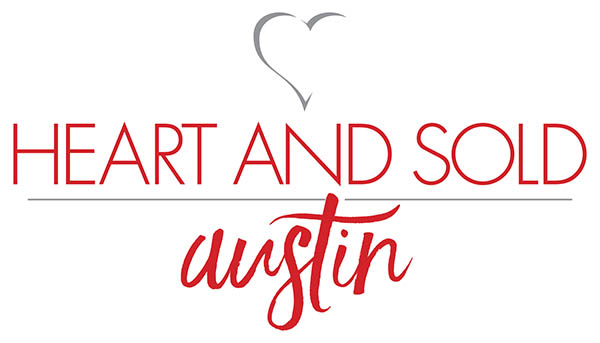
One of the things that caused The Successful Thinker to come about is my application of the life experience that my pharmacy customers were giving me every day, all day at the pharmacy. I was a pharmacist in large retail pharmacies for 25 years. Some of the best advice I ever got came from everyday people who had either won or lost in the real marketplace. That’s what I’m finding with the podcast. People like yourself who are out there doing it can lead to some incredible insight that the books leave off. Thanks again for agreeing to share your program and your ideas with us. One of the things that you mentioned was lifelong learning. That’s an incredible passion for me and the other Go-Givers, Bob Burg and Kathy Tagenel and so forth. What process do you put in place to keep your learning curve at the highest level possible?
Daily, I listen to podcasts definitely and I’ve always got one or two or three books that are stacked up along the side of my bed to read and review. I have a tendency to read and reread the same book over and over again because I feel like every time I take a look at it, it speaks to me differently. Those ones that I highly value like Think and Grow Rich book as well as The Go-Giver, I get new insight as I’ve evolved. I feel like I take something new away from it at every time that I read that book again.
Bob Proctor, one of the higher personal development powers who is said to be someone who The Go-Giver is based on said something to the effect of, “Whenever you read a book for the second time, you don’t see something that wasn’t there before. You see something in yourself that didn’t exist before.” Can you tell us a story about a time when you were stuck and ready to give up? How did you get yourself unstuck? What happened to help you change your thinking around a given situation or problem?
I alluded to it earlier when you first introduced me. A time that I felt like I was stuck, the most pivotal moment for me that comes to mind, is when I realized that the corporate setting and traditional parenthood was not going to be the right path for me. I had always thought once I got married, I’d leave my career behind, have kids and take care of the home. What I found out quick was I was terrible at housekeeping and I didn’t enjoy it. I was turning into a terrible person for my poor husband. I felt like at that point I had done all the right things. I had experienced what others would define as a high level of success. I had a great job, a great husband and three great kids. I knew that what I was doing in my heart I wasn’t satisfied. It wasn’t enough for me.
The story does get good in reference to where I am now. Anyone who meets me now thinks, “Who’s this ball of fire with a great personality and optimistic state of mind?” It had to get pretty bad first. In my 20s and 30s, I was climbing, getting my schooling out of the way and working to establish a strong reputation by working hard, showing up early and working long hours. That’s what my parents taught me to do. They said successful people show up before the boss does and they leave after the boss goes home. That’s what I did. In my early to mid-30s when I got married and started having kids, it looked great from the outside exactly like what I think most of us consider to be a perfect life but it wasn’t perfect.
You can't hold too much sand with a closed fist. When you open your hand, you definitely can. Share on XAround that time when I turned 40, I realized I wasn’t super happy. I didn’t feel successful. I felt purposeless. Even worse, I felt guilty for feeling that way. The truth was I did feel stuck. My husband was working hard as our primary breadwinner. I felt like a selfish person for wanting more. I was working hard to impress my peers, superiors and their acknowledgments were not providing the fulfillment that I longed for in my life. When I read that Think and Grow Rich book, which was super pivotal in my life, it changed me forever. That book gave me permission to take control and to realize that I only had one life to live. I had to stop blaming others, my circumstances and do what I needed to do to flow with my own destiny.
I remember realizing that my friends, my family, my husband, my kids, they might not like the results of what I was going to do next. I knew that if I didn’t like who I was, how could they enjoy being around me? I had to take that risk. At that point, I got very intentional about figuring out what I wanted to do and what I didn’t want to do. I wrote those things out and meditated on them with that pyramid analogy I gave you earlier. I recognized some important points. I can verbalize them so easily now. I knew I didn’t want to pay bills. I didn’t want to take one vacation a year or twice a year. I wanted my life to be an adventurist vacation.
I didn’t want to provide just for my family, I wanted to provide for others and make a difference in my world. I knew that doing well at the current job that I had at that point wasn’t enough. I was bored. I realized I wanted to learn more. I wanted a job that would continuously challenge me because learning for me is fun and solving complicated problems is exciting. I knew I wanted that. I wanted to experience the thrill of making a significant impact on people’s lives. I’m not going to lie, I wanted to make a lot of money because as I said, I’ve wanted to dream big, live big and do that for myself. I wanted my kids to see that. I wanted my family to be proud of me and for the community to be inspired by the work that I was doing.
Through that exercise, I found forgiveness than permission to go for it. That’s when I started my own business and left the corporate world behind. I’ve never been a person who loves things, expensive things or accumulate things. Houses to me weren’t that exciting but what excited me was having the opportunity to help people achieve their goals. It held me back from getting my real estate license and pursuing that career because I thought, “I’m not a big house person. I could live on a boat. I don’t care about stuff.” The truth is that’s what makes me so good at what I am and what I do because people look to me and they know I’m going to have an unbiased opinion. I’m going to help them achieve their goals. It’s fun.
What you’re doing is you’re showing one of the core concepts of The Go-Giver book and that’s that Fifth Law of Stratospheric Success, the one that says, “You have to be prepared to receive as well as to give because now what that does is that makes you that whole person.” I applaud you for saying “I’m not going to lie, I wanted to dream big and I wanted to live big.” I feel like a lot of people struggle with that. Have you noticed that with your co-workers or your cohorts in real estate where they don’t want to accept that big dream?
You can't hold too much sand with a closed fist. When you open your hand, you definitely can. Share on XThat was the most challenging thing for me. I felt like I was stuck making the level of money that I made in my career for so long because I didn’t give myself permission to break that barrier until I lead with giving. When giving became my first priority, nothing could stop me. I had a difficult time in my early years with that Law of Reciprocity. The key to success is opening up your fist like they say, “You can’t hold too much sand with a closed fist. When you open your hand, you definitely can.” That’s what happened. All of a sudden, knowing that at the forefront of my income was to be able to empower others through their circumstances, I never thought about it again.
That’s an important concept. You’re empowering others by giving yourself permission to empower yourself and to accept the gifts of your rewards. I’m proud of you for that because I know that was a major shift for you. I know that took a lot of soul searching and a lot of the top of the pyramid. As you’re looking towards your future and you start setting goals to approach those big dreams in the short, the medium and in the long-term, how do you go about it?
I listened to one of your podcasts that was an interview with John Mitchell. I’m considering his program because he has the practical application for the Think and Grow Rich ideas and strategies. One of the things that we need to do is we need to recognize that it’s how we think and then the habits and activities that we create for ourselves on a daily basis that lead to us achieving our goals. That’s something that I haven’t been great at. I would say I’ve been good at it. I do have that entrepreneurial, very creative spirit, writing down specific goals and holding myself accountable to them sometimes can feel a little bit oppressive, to be honest. I know that is the next place that I want to go in my success and challenging myself. Getting organized and mastering time blocking is difficult for me. That’s one of my goals is being committed to continuing education and having a healthy lifestyle.
One of the things about John Mitchell, you mentioned that you heard the podcast. John Mitchell is probably one of the most genuinely nice concerned person because one of the things he did through his process to the practical application of Think and Grow Rich is he did ask himself, “Who do I want to be?” I love that because of one of the things that Successful Thinkers believe is it’s more than reading the book. You want to stay, “Where can I apply this book?” I’ve run into that myself where you can easily get in the habit of reading a book at a week for a year. My friend, Darren Hardy, clued me into something. He said, “I’d rather you read the same book 40 times than reading one book a week for 40 weeks.” Once we started doing that and meeting up with people like John, the whole world changes. Do you like to put your goals down on paper? Do you like to use vision boards? Do you like to share them with people you love? How do you go about that?
I love vision boards. I’ve done that before. I have to be honest, I have not been very good about writing things down and revisiting them, which is why I love John Mitchell’s program with you. I’m considering it very seriously. I love Trello. I don’t know if you’ve ever used Trello.

Adding Maximum Value: If you talk to people who you already know, love, and trust you, they can easily become your raving fans as long as you teach them how to help you.
I’ve looked at it. I’ve always wondered, “Would it do for me what it reports to do?” Tell us a little bit about how you use it.
I love it because I’m a very visual person. I’m the type of person that has a hard time staying organized at my desk because I like to see things as reminders of what I need to do next. I end up creating stacks and that doesn’t usually work because stacks become stacks upon stacks. The next thing you’re looking for that stack that’s under all the additional stacks. Trello is an app. It’s free. You can pay an additional amount to enhance it or what have you. I haven’t found the need to do that. What you can do is you can create what’s called a vision board. You can create boards and you can create cards within those boards.
What it does is it allows you to take a quick glance of a lot of moving parts. I learned this from a coach that I was working with. He said to me, “Chadwin, you’re trying to talk to too many people.” I have a lot of people in my database. He said, “The truth is there are about 250 people who you would invite to your wedding and 250 people who would come to your funeral. What we need to do is we need to find out who those people are because the most important thing that you can do is love on those people who you already love, who you already know to love you.” You have that Law of Authenticity that we know about from The Go-Giver in that relationship. A lot of sales people in my industry are obsessed with cold calling and it’s a difficult thing to do. They hire coaches to talk them out of the discomfort of making those phone calls.
What we learned is if you instead talk to 50 to 100 to 200 people who you already authentically know, love and trust and you know that they love and trust you, those people can easily become your raving fans as long as we teach them how to help us because they want to help us. The first board that I created was my top 50 contacts, which was 100 because typically my friends come in couples and pairs. Touching them authentically on their important milestones, their birthdays and things that they care about. Being in the flow and in rhythm with those individuals, sales all of a sudden became so easy because it became more about helping the people that I cared about than it did about the end-all-be-all dollar.
I want to underline a couple of things that you said. Number one is the stacks. Stacks upon stacks upon stacks. One of the reasons that we love to do The Successful Thinker podcast is that we get to hear about things like Trello that people are using, that other people don’t even know exist or aren’t sure if they should try. First of all, thank you for suggesting that because what I find is that I get tired of looking at the stack and eventually I throw it away. That drives me crazy because I know there are good ideas in that stack. First of all, thank you for suggesting Trello.
The habits and activities that we create for ourselves on a daily basis lead to us achieving our goals. Share on XThe second thing and that was brilliant, I remember hearing that before. There are 250 people that would come to your wedding. Instead of focusing on your top 50 or top 100 or top 250, you are right. I have 4,000 Facebook friends and I don’t even know who 3,750 of them are. I was thinking that maybe what I should do is delete everybody but the top 100 so I could stay involved in their lives and find out what’s going on with them. I love the way you approach that in that you want to boil down your contacts into heartfelt connections.
Social media is a whole other conversation. I don’t consider myself an expert on it. One thing that you can do, Corey, is you can create your own group. I call them allied resources or good friends or VIP or whatever. You can keep your 4,000 because those people are in flow with you. You may not be in flow with them that they are following you for a reason and you don’t want to lose that. They’re gaining value from who you are. What you can do is you can create a friends group that’s named to something different. If you want to be more intentional about speaking with those people, then you can create an audience to just them if you want to do that.
That’s a brilliant idea. I had never thought of it that way. You could call it friends of Chadwin or friends of Corey if you want to.
I name mine my VIPs. Those are the people who get invited to my events that I spend a lot of money on and things like that because they’re my allied people. You can stratify the way that you talk to people on social media as well.
One of the things that do happen to me from time to time is people will say, “I haven’t commented or I don’t make a habit of liking a post. Thank you so much for reminding me because I’ve been watching you,” something like that. I won’t delete the 3,750 that I was thinking about. There are things that separate Successful Thinkers from average thinkers. Put in another way, there are reasons why some people are amazingly Successful Thinkers, but the vast majority of people struggle to get through their days. In your opinion, what separates average thinkers from successful thinkers?

Adding Maximum Value: We get to create our own perfect life. There is nothing about the life that we’re living that’s done to us.
I had an epiphany, I can’t even remember. It was a book called The Leading Edge. It talks about how no matter what we do. It’s like an airplane flying from one destination to another. It doesn’t fly in a straight path. The pilot is always making minor course corrections, up, the downside to the left or the right. Our life is very much the same way. We’re constantly course-correcting because the truth is you’re never on an even keel. You’re either going down a little or you’re going up a little. It’s very important to be mindful about that and that’s where those habits come into place. Why I want to become more intentional about how I set forth on my daily activities is because we all have habits, good ones and bad ones.
The more that you do the good habits and stay focused on an intentional about that, the more you’re leading yourself towards your goals. If you’re sleepwalking through life, you’re not staying steadily on an even keel. You’re more than likely going south. What separates a successful and go from an average individual is a person who doesn’t recognize that and isn’t being thoughtful about the activities, the people they surround themselves with on a daily basis and the messages that they’re allowing themselves to listen to. We can all get caught up in the drama. It’s easy to do. I try to teach my kids, “Drama feeds drama. Try to stay away from it.”
It’s the people that you surround yourself with and the messages that are coming into your head. Also be intentional about the voice inside your head, which is something that I’ve started to apply more and more. We all have this strange voice that’s telling us stories. It may have been your podcast that made me think about that as well. One of your first sessions is we can redirect that story. We don’t have to listen to the story in our head. It’s typically not even telling us the truth.
That’s one of the biggest lessons that I took away from Think and Grow Rich. When I first read Think and Grow Rich, I thought that my brain had a mind of its own. I felt like I was a victim of wherever it wanted to go that day. Napoleon Hill taught me the process of auto-suggestion, where you are constantly repeating to yourself the message and the story that you want your brain to learn. I felt like that totally changed my life because as you so beautifully said, you can direct the stories that you’re telling yourself based on the outcomes that you want your life to achieve.
It’s so empowering to know that the truth is that we get to create our own perfect life. There is nothing about the life that we’re living that’s done to us. The truth is we get to choose.
We get to create our own perfect life. There is nothing about the life that we're living that's done to us. Share on XI’m 53 and one of the things that’s an interesting age because you listen to people who are you 25 years ago talk about how they’re a victim of their situation and circumstances and how that’s not their fault, how their life is never going to be good because the world is against them. I know that was me 25 years ago. What I also know is that once I changed that story in my head, it became incredibly empowering because when it was my fault, when it was my responsibility to fix it, then I could do something about it. If it’s the economy, if it’s the government, then I’m a victim. Thank you for reminding me of that. Chadwin, I know that you are interested in developing a huge philanthropic endeavor going forward. Will you please share with our audience what that’s all about?
I always tell people there’s a reason why we hear that God’s word is a lamp unto our feet and a light unto our path, but he doesn’t eliminate the whole path. That’s where I am. What I know to be true is that I talked to a lot of agents across the nation. I have the opportunity to travel quite a bit. When I traveled for a vacation with my family, I typically take a day or two out of my vacation to spend on my business. What I do is I network with a lot of other agents across the nation and collaborate with them. I learn from them. They learn from me. They’re always surprised by the Heart and Sold concept and the idea of giving back first and that kind of thing.
They always want to learn from me about that. Another thing that runs in parallel with that that I’ve found to be true is that I give a lot of money on a yearly basis. What feels like painful to me sometimes, but in comparison to the need that is out there and also in comparison to either people or organizations, who are farther down the path than I am, it can seem minutia. It’s a daunting thing. What I’m working on is creating a way to leverage relationships within our communities, to create more of a movement that people can get on the bandwagon with us. Philanthropic organizations that will allow people to opt-in at a very low cost to learn from me some of the principles that I’ve put into place in my business and create a giveback movement hyper-locally in their own community. Basically, using proven principles that I have already put into place that have been successful for me and helping other agents learn how to do that as well. It’s probably going to take three to five years to fully layout properly but I’m doing some very significant endeavors over the course of the next year to put some of the foundations firmly in place.
You have that three to the five-year vision of something much bigger than yourself. A lot of people look at me and they go, “Corey, it’s five years. I can’t even think about five weeks from now.” What I learned from Brian Tracy is that you’re going to be five years older anyway, so why not be five years further along on something that outlives you when you leave this world. I’m excited to follow your journey and to help you with that if I can and I’m sure our audience is as well. Chadwin, can you tell us more about where our audience can go to learn more about you and how they can help you in your philanthropic endeavors?
The best place to immediately connect with me is on my website, which is HeartAndSoldAustin.com. It will redirect you because I have a link that’s something about SEO, SellBuyAustinTxHomes.com. Don’t be alarmed when it redirects you, but HeartAndSoldAustin.com is what you can search for to find me on the World Wide Web. I have a personal page on Facebook and a business page and Instagram. I have to be honest, I’m more active on my personal page than any place else. They can easily find Chadwin Barley on Facebook.
I just realized that you are from Austin, Texas because John Mitchell is also from Austin, Texas. My wife who is a wonderful salesperson for a product called Juice Plus is going to Austin, Texas. I wasn’t sure if I wanted to go with her, but it seems that people from Austin, TX are absolutely delightful and extremely smart. I might have to go there to see if I can absorb some of their smartness. Successful Thinkers, I want to cover a couple of things. What Chadwin essentially said to us is that you don’t have to settle for your condition and circumstances. You don’t have to settle for the life that you’re living.
You can do more, be more and have more but to do that, you have to change your thinking. You have to change the story that plays in your head. You have to change the way you approach life. You’ve got to learn from the people that have already been there. I would encourage you to listen to Chadwin’s story a couple of times. I want you to check that out because this lady is out there killing it in Austin, Texas and you could do the same. Remember going forward that no matter what happens, where you are, what you’re doing, Chadwin and I, we believe in you. Chadwin, thanks again for coming on our show. I appreciate you.
The pleasure was all mine. I look forward to meeting you in person when you come to Austin.
Thanks.
Thank you.
Important Links:
- Heart and Sold Austin
- The Go-Giver
- Think and Grow Rich
- John Mitchell – Previous episode
- Trello
- The Leading Edge
- Chadwin Barley – Facebook Account
- SellBuyAustinTxHomes.com
- Facebook – Heart and Sold Austin
- Instagram – Heart and Sold Austin
- Juice Plus
- www.HeartAndSoldAustin.com
- Facebook.com/chadwin.barley
About Chadwin Barley
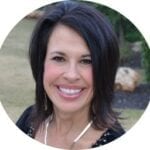 Chadwin Barley, Former Marketing Executive turned Entrepreneur in 2013 (Real Estate).
Chadwin Barley, Former Marketing Executive turned Entrepreneur in 2013 (Real Estate).Love the show? Subscribe, rate, review, and share!
Join the Successful Thinker Community today:


